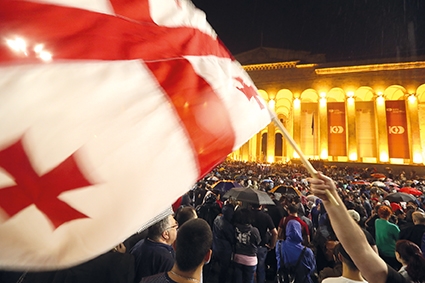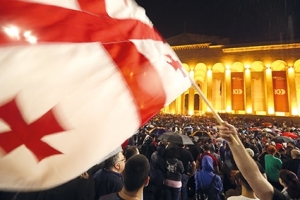Democracy, as Good as it Gets (So Far)
I have always been an inveterate critic of our political style and content, so much so that I remember several cases of warnings received to stop being harsh in my writings. As such, I can’t be blamed for being mild and sparing when it comes to my portrayal of the Georgian social and political reality. Being that ruthless towards my own folk, I was still a little disappointed to hear the utterance of the former president of the NATO Parliamentary Assembly Rasa Jukneviciene about the already bygone electoral epopee in Georgia, worded for the Georgian bureau of Voice of America: ‘If we compare the presidential elections to the 2012 elections, we will see no big step forward, but a step backwards.’
She alluded to the disproportionate use of administrative resources in favor of one side against the other, not doubting at the same time that by the level of democracy and reforms, Georgia is a leader in the region. Moreover, the reason for concern was underlined, in strong hopes that it would not affect Georgia's Euro-Atlantic aspirations. Wow! And poor stupid me for thinking that things were just the contrary in the Republic. I respectfully admit that Rasa knows way more in politics than I do but I also suspect that I might have a better feel for what has been happening in the Georgian political crucible in the last 30 years or so. I am far from making any overstatements about the quality of democracy in Georgia, but one can see even with an unequipped eye that we have never had this big a sense of a genuine ballot in this country before. In these presidential elections, predictions were rendered unworkable, political scientists avoided making daring prognostic guesses and the forecast was practically considered a lost cause.
Indeed, the level of democracy as such was elevated to the point where terms like “rigging” and “gerrymandering” became obsolete. In the beginning, most of the electorate was so lackadaisical that half of the voting public did not even turn up at the poll stations, leaving the ballot boxes almost empty. But when the runoff was declared as a result of the first round, the lukewarm electoral attitude was changed and the whole country became involved in the unseen-in-the-past political tug of war. The public excitement towards the electoral outcome was blown into unprecedented parameters, thus creating an effect of a real western-style electoral event.
In fairness to my descriptive efforts, I must ask for recognition that, while the quality of democracy has reached the acme, the sides have been using against each other the worst kinds of political language of hatred and derogation. The irrelevant emotionality and reciprocal negativity between the sides frustrated and tired the electorate to the utmost, but despite the raucousness of the process and the emphasized unfairness of black PR against one other, the parties still demonstrated a professional conception of democratic ways and means, well manifested in the content of ongoing comments and the style of making those comments (in most cases).
Without doubt, the process of democratic maturation has solidified the entire nation’s political stance in Georgia: the electorate became more observant and educated; the candidates turned into eye-catching political animals; the opposing political groupings presented themselves as professional fighters; the media skillfully tried to push their favorite race horses towards the winning finale, and the watching public, despite the edginess of the situation, managed to equip itself with as much patience as possible to see a peaceful end to the race.
What more can democracy be, I wonder. How can anyone say we have made a step backwards? Just the contrary: we have registered huge progress on the way to democratic development, the best token of this being the presumption that the political struggle in Georgia has doubtlessly acquired striking acuteness, believable fairness and relative western logicality. This nation is trying really hard to justify the relevancy of soviet collapse, its breakup with Russia and its marriage with the West, although still unconsummated. One could say that to be critical is much easier than to be appreciative. I know very well the drawbacks of our democracy, and our wild capitalism too, but could we have done more and better in just 30 years of time? I think not. We would’ve if we could’ve. No other nation could have, even if they had tried even harder than us.
By Nugzar B. Ruhadze
Image source: neweurope.eu












